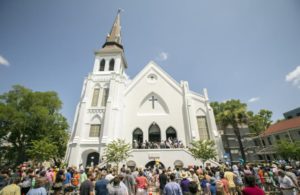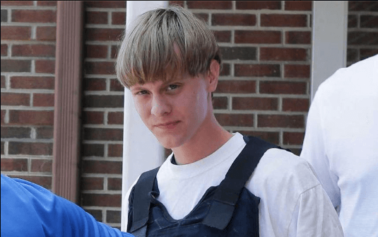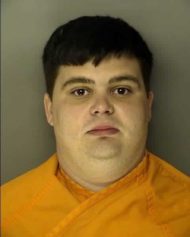
Crowds gather outside the Emanuel AME Church in Charleston, June 21, 2015, AP Photo/Stephen B. Morton
One year ago today, nine worshipers were callously executed during an evening Bible study at the Emanuel African Methodist Episcopal Church in Charleston, South Carolina.
Dylann Roof, a then 21-year-old white nationalist, sat and prayed with the unsuspecting parishioners for an hour before opening fire, killing six women and three men.
The world watched in awe as relatives of the victims stood before the gunman at a bond hearing two days later, and one-by-one offered forgiveness and prayer.
“I forgive you,” said Nadine Collier, daughter of 70-year-old Ethel Lance. “You took something very precious from me. I will never talk to her again. I will never, ever hold her again. But I forgive you. And have mercy on your soul.”
Authorities unearthed a racist manifesto Roof left on his website just hours before the shooting directed at Blacks, Jews and Hispanics.
In the wake of the racially motivated attack, civil rights activists called for institutions across the country to remove what is for many African-Americans a lingering symbol of hate: the Confederate flag. Retailers immediately pulled the symbol from their shelves. After weeks of contentious debate, South Carolina Gov. Nikki Haley signed a bill July 7 to take down the battle relic that had flown outside the State Capitol for 54 years.
A federal grand jury indicted Roof on 33 counts last summer, including federal hate crime and firearm charges. U.S. Attorney General Loretta Lynch announced last month the Justice Department would seek the death penalty. State prosecutors, also seeking capital punishment, charged Roof with nine counts of murder and one count of possessing a firearm while committing a violent crime. South Carolina is one of only five states with no hate crime law.
A year later, family members continue to cope with the devastating loss, but many have chosen not to include Roof in their thoughts.
“The media ran with the forgiveness narrative, praising the ability of the victims’ families for their graciousness and faith,” Rev. Sharon Risher, sister to Nadine Collier, wrote Wednesday in a piece for vox.com “I didn’t forgive Dylann Roof. And I still don’t forgive him.” The siblings also lost cousins Susie Jackson and Tywanza Sanders.
Risher said she was hurt that the public assumed she and the entire Lance family shared her sister’s views.
“I’m not bitter,” Risher told Reuters Thursday. “But I’m just not ready to forgive you if you don’t even act like you want to be forgiven.”
The hospital chaplain shared her testimony at a news conference on Capitol Hill Thursday morning, following Senate Democrats’ 15-hour filibuster to demand support for stricter gun laws.
“I plead with you, with everything I have in my heart, to join me in this walk to disarm hate,” Risher said.
Anthony Thompson, pastor at the nearby Holy Trinity Reformed Episcopal Church, also addressed Roof at the hearing last June. “I would just like him to know that … I forgive you, my family forgives you,” he said then.
He lost his wife, Myra, who led Bible study for the first time on that fateful night. The reverend told Reuters the offer of absolution helped mend his family’s heartache.
“Dylann is not a part of my life or the life of my children,” Thompson said Thursday. “That’s why we forgave him so that we can move on. We’re through with him.”
Thompson, who has not followed Roof’s journey through the judicial system, said his time is devoted to church and increasing awareness against gun violence.
Chris Singleton, a sophomore on the Christian Southern University baseball team, was the first of the loved ones to mention forgiveness. The outfielder showed remarkable strength speaking to reporters the day after his mother Sharonda Coleman-Singleton was slain.
“Love is always stronger than hate,” he said from the school’s baseball diamond. “If we just love the way my Mom would, the hate won’t be anywhere close to what love is.”
The young man told Sports Illustrated he has made a conscious decision to keep Roof out of his heart and thoughts. His mother’s death has given his life a deeper purpose.
“I live for both God and my mom now. They go hand in hand. My mom knew I’d need faith one day when she was gone. She got me ready for this moment. I will be successful because of how she raised me.”
Anthony Hurd continues to harbor anger for the loss of his wife, Cynthia, whose career-long dedication to the Charleston County Public Library system inspired officials to rename a local branch in her honor. City council members voted unanimously to instate the Cynthia Graham Hurd St. Andrews Regional Library on June 25, 2015.
The 46-year-old widower, overwhelmed with grief, has not gone back to his job as mariner merchant.
“The only way I can jump for joy for the death penalty is if I am the one pulling the switch,” Hurd said, per Reuters. “I have a hole in my chest, in my heart and my soul big enough that you could ride a freight train through it.”


